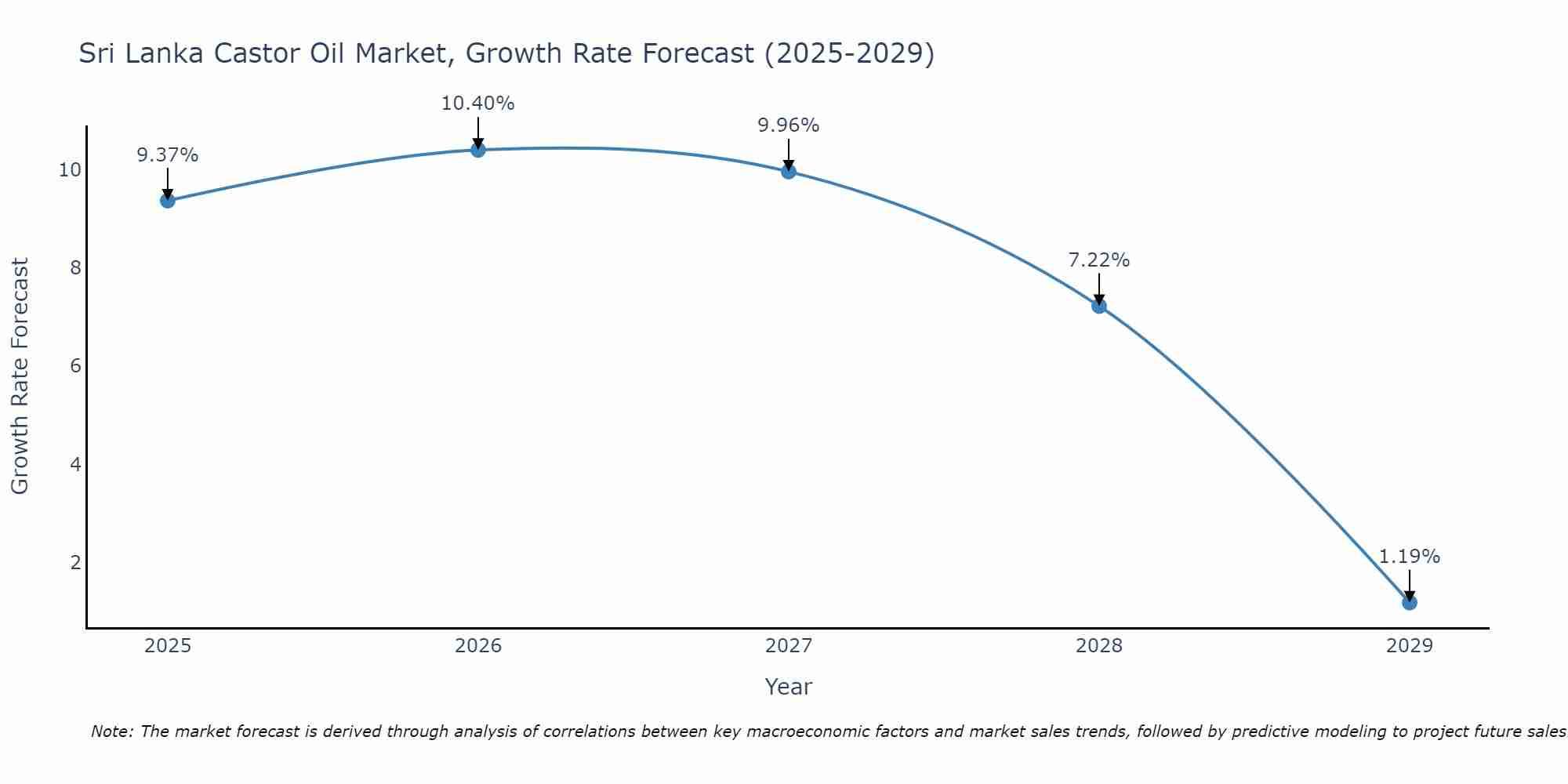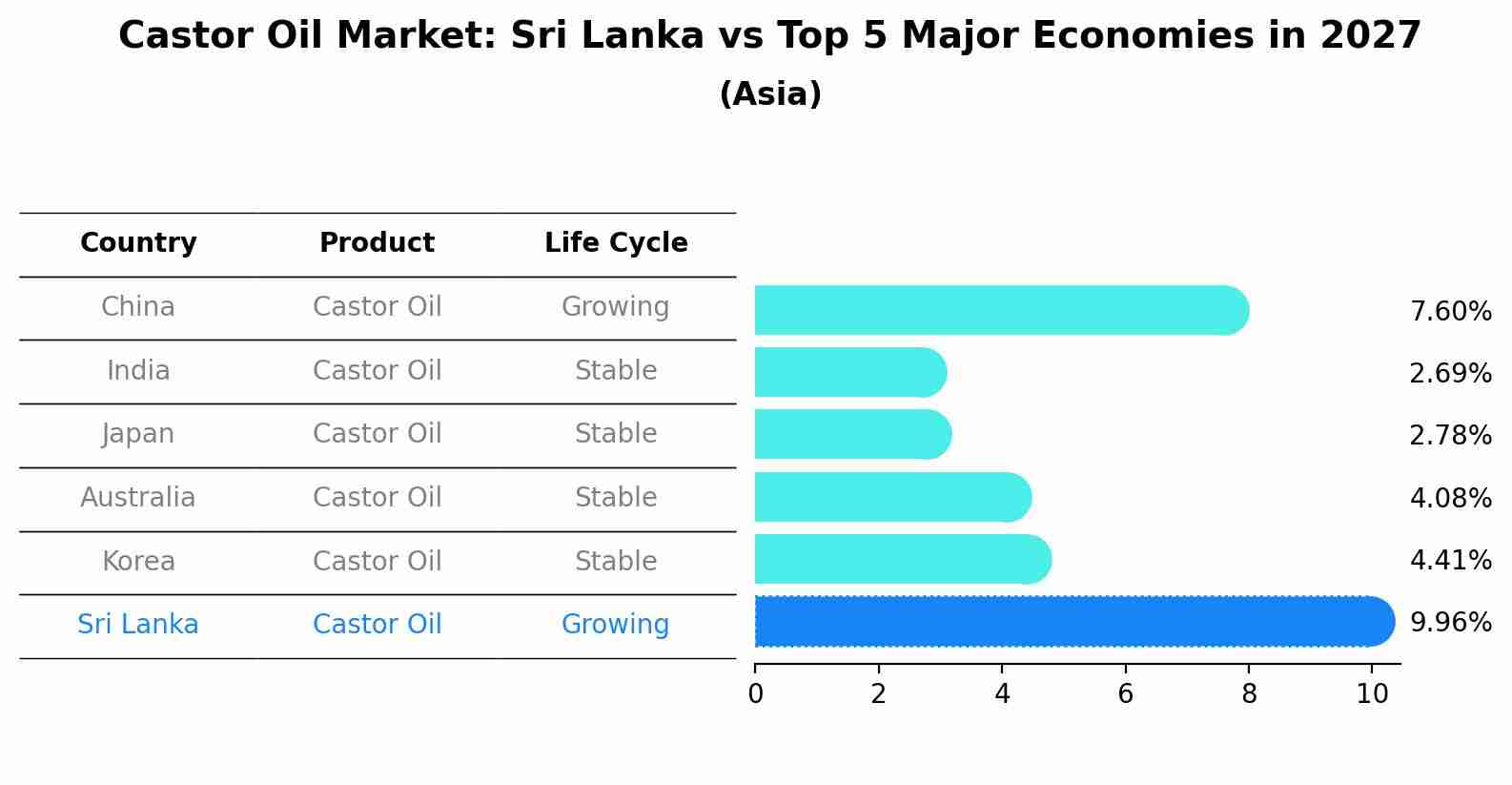Sri Lanka Castor Oil Market Outlook | Analysis, COVID-19 IMPACT, Share, Trends, Size, Revenue, Growth, Forecast, Industry, Value & Companies
| Product Code: ETC410067 | Publication Date: Oct 2022 | Updated Date: Apr 2025 | Product Type: Market Research Report | |
| Publisher: 6Wresearch | No. of Pages: 75 | No. of Figures: 35 | No. of Tables: 20 | |
Sri Lanka Castor Oil Market Size Growth Rate
The Sri Lanka Castor Oil Market is projected to witness mixed growth rate patterns during 2025 to 2029. Starting at 9.37% in 2025, the market peaks at 10.40% in 2026, and settles at 1.19% by 2029.

Castor Oil Market: Sri Lanka vs Top 5 Major Economies in 2027 (Asia)
Sri Lanka's Castor Oil market is anticipated to experience a growing growth rate of 9.96% by 2027, reflecting trends observed in the largest economy China, followed by India, Japan, Australia and South Korea.

Sri Lanka Castor Oil Market Overview
Castor oil production in Sri Lanka caters primarily to the pharmaceutical and cosmetic industries. The market is influenced by factors such as agricultural practices, export demands, and global trends in organic and natural products. Sustainable practices and quality standards play a crucial role in shaping the market dynamics.
Drivers of the market
In Sri Lanka, the castor oil market is witnessing robust growth due to its diverse applications across various industries. Castor oil is widely used in pharmaceuticals, cosmetics, and industrial applications such as lubricants and biofuels. The increasing awareness regarding the benefits of castor oil, such as its antimicrobial and anti-inflammatory properties, is driving its demand in the healthcare and personal care sectors. Moreover, the agricultural sector plays a crucial role as Sri Lanka continues to expand its castor oil production to meet both domestic and export demands.
Challenges of the market
In Sri Lanka, the castor oil market encounters challenges related to inconsistent crop yields and quality due to varying weather conditions. Limited investment in modern extraction technologies and infrastructure also hampers the market`s ability to meet global quality standards and compete effectively on the international stage.
Government Policy of the market
The Sri Lankan government recognizes the potential of castor oil as a valuable agricultural export and has introduced several initiatives to support its cultivation and processing. Policies include providing subsidies for castor seed production, offering technical training to farmers on best practices, and facilitating access to markets through cooperative models. The government`s focus on promoting organic farming practices and certifying organic castor oil products has also helped boost the market, catering to the increasing global demand for natural and sustainable products.
Key Highlights of the Report:
- Sri Lanka Castor Oil Market Outlook
- Market Size of Sri Lanka Castor Oil Market, 2021
- Forecast of Sri Lanka Castor Oil Market, 2028
- Historical Data and Forecast of Sri Lanka Castor Oil Revenues & Volume for the Period 2018 - 2028
- Sri Lanka Castor Oil Market Trend Evolution
- Sri Lanka Castor Oil Market Drivers and Challenges
- Sri Lanka Castor Oil Price Trends
- Sri Lanka Castor Oil Porter's Five Forces
- Sri Lanka Castor Oil Industry Life Cycle
- Historical Data and Forecast of Sri Lanka Castor Oil Market Revenues & Volume By End Use for the Period 2018 - 2028
- Historical Data and Forecast of Sri Lanka Castor Oil Market Revenues & Volume By Pharmaceuticals for the Period 2018 - 2028
- Historical Data and Forecast of Sri Lanka Castor Oil Market Revenues & Volume By Lubricants for the Period 2018 - 2028
- Historical Data and Forecast of Sri Lanka Castor Oil Market Revenues & Volume By Paints for the Period 2018 - 2028
- Historical Data and Forecast of Sri Lanka Castor Oil Market Revenues & Volume By Soaps for the Period 2018 - 2028
- Historical Data and Forecast of Sri Lanka Castor Oil Market Revenues & Volume By Others for the Period 2018 - 2028
- Sri Lanka Castor Oil Import Export Trade Statistics
- Market Opportunity Assessment By End Use
- Sri Lanka Castor Oil Top Companies Market Share
- Sri Lanka Castor Oil Competitive Benchmarking By Technical and Operational Parameters
- Sri Lanka Castor Oil Company Profiles
- Sri Lanka Castor Oil Key Strategic Recommendations
Frequently Asked Questions About the Market Study (FAQs):
- Single User License$ 1,995
- Department License$ 2,400
- Site License$ 3,120
- Global License$ 3,795
Search
Related Reports
- Saudi Arabia Manlift Market (2025-2031) | Outlook, Size, Growth, Trends, Companies, Industry, Revenue, Value, Share, Forecast & Analysis
- Uganda Excavator, Crane, and Wheel Loaders Market (2025-2031) | Strategy, Consumer Insights, Analysis, Investment Trends, Opportunities, Growth, Size, Share, Industry, Revenue, Segments, Value, Segmentation, Supply, Forecast, Restraints, Outlook, Competition, Drivers, Trends, Demand, Pricing Analysis, Competitive, Strategic Insights, Companies, Challenges
- Rwanda Excavator, Crane, and Wheel Loaders Market (2025-2031) | Strategy, Consumer Insights, Analysis, Investment Trends, Opportunities, Growth, Size, Share, Industry, Revenue, Segments, Value, Segmentation, Supply, Forecast, Restraints, Outlook, Competition, Drivers, Trends, Demand, Pricing Analysis, Competitive, Strategic Insights, Companies, Challenges
- Kenya Excavator, Crane, and Wheel Loaders Market (2025-2031) | Strategy, Consumer Insights, Analysis, Investment Trends, Opportunities, Growth, Size, Share, Industry, Revenue, Segments, Value, Segmentation, Supply, Forecast, Restraints, Outlook, Competition, Drivers, Trends, Demand, Pricing Analysis, Competitive, Strategic Insights, Companies, Challenges
- Angola Excavator, Crane, and Wheel Loaders Market (2025-2031) | Strategy, Consumer Insights, Analysis, Investment Trends, Opportunities, Growth, Size, Share, Industry, Revenue, Segments, Value, Segmentation, Supply, Forecast, Restraints, Outlook, Competition, Drivers, Trends, Demand, Pricing Analysis, Competitive, Strategic Insights, Companies, Challenges
- Israel Intelligent Transport System Market (2025-2031) | Strategy, Consumer Insights, Analysis, Investment Trends, Opportunities, Growth, Size, Share, Industry, Revenue, Segments, Value, Segmentation, Supply, Forecast, Restraints, Outlook, Competition, Drivers, Trends, Demand, Pricing Analysis, Competitive, Strategic Insights, Companies, Challenges
- Uganda Precast and Aggregate Market (2025-2031) | Strategy, Consumer Insights, Analysis, Investment Trends, Opportunities, Growth, Size, Share, Industry, Revenue, Segments, Value, Segmentation, Supply, Forecast, Restraints, Outlook, Competition, Drivers, Trends, Demand, Pricing Analysis, Competitive, Strategic Insights, Companies, Challenges
- Australia IT Asset Disposal Market (2025-2031) | Strategy, Consumer Insights, Analysis, Investment Trends, Opportunities, Growth, Size, Share, Industry, Revenue, Segments, Value, Segmentation, Supply, Forecast, Restraints, Outlook, Competition, Drivers, Trends, Demand, Pricing Analysis, Competitive, Strategic Insights, Companies, Challenges
- UAE Building Thermal Insulation Market Outlook (2025-2031) | Revenue, Companies, Share, Trends, Growth, Size, Forecast, Industry, Analysis & Value
- Portugal Electronic Document Management Market (2025-2031) | Strategy, Consumer Insights, Analysis, Investment Trends, Opportunities, Growth, Size, Share, Industry, Revenue, Segments, Value, Segmentation, Supply, Forecast, Restraints, Outlook, Competition, Drivers, Trends, Demand, Pricing Analysis, Competitive, Strategic Insights, Companies, Challenges
Industry Events and Analyst Meet
Our Clients
Whitepaper
- Middle East & Africa Commercial Security Market Click here to view more.
- Middle East & Africa Fire Safety Systems & Equipment Market Click here to view more.
- GCC Drone Market Click here to view more.
- Middle East Lighting Fixture Market Click here to view more.
- GCC Physical & Perimeter Security Market Click here to view more.
6WResearch In News
- Doha a strategic location for EV manufacturing hub: IPA Qatar
- Demand for luxury TVs surging in the GCC, says Samsung
- Empowering Growth: The Thriving Journey of Bangladesh’s Cable Industry
- Demand for luxury TVs surging in the GCC, says Samsung
- Video call with a traditional healer? Once unthinkable, it’s now common in South Africa
- Intelligent Buildings To Smooth GCC’s Path To Net Zero













